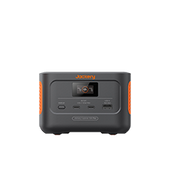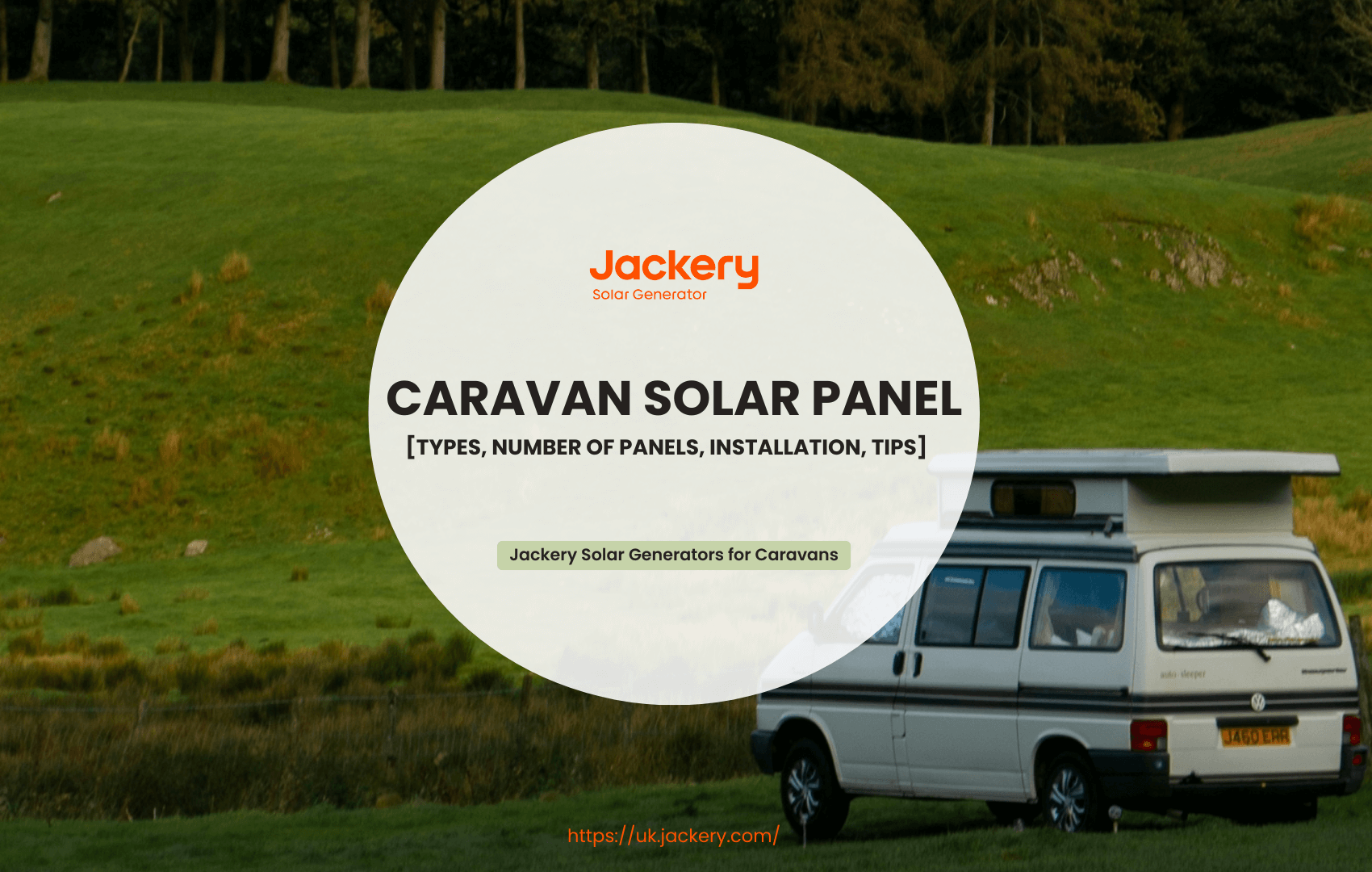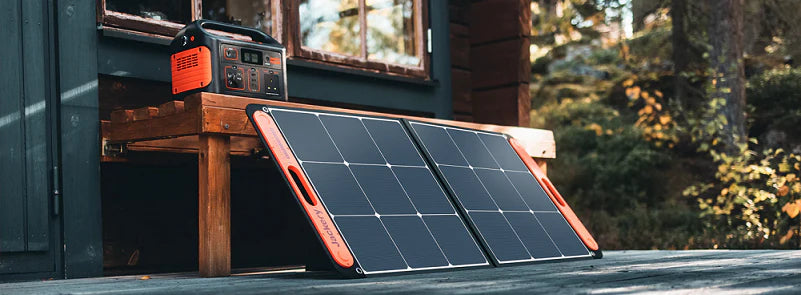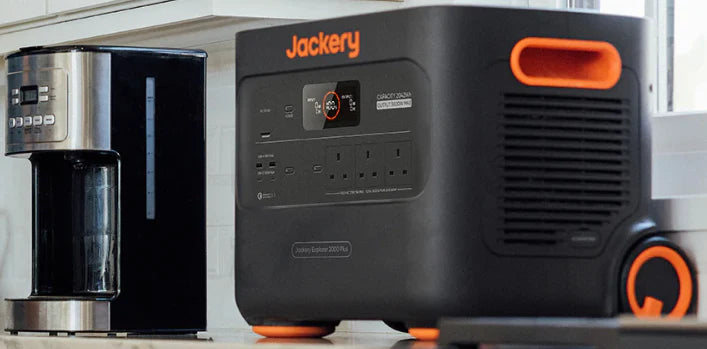|
Key Takeaways: |
|
l Caravan solar panel is a device that can convert solar radiation energy into electrical energy. l Caravan solar panels include flexible, framed, and portable solar panels. l Generally, a 200-watt solar panel is enough for most caravans. l Choose caravan solar panels according to your budget and actual needs. l Please determine the load capacity of the caravan roof before installing solar panels. l We recommend Jackery Solar Generator 2000 Plus or 1000 v2 portable power station to charge your essentials effectively. |
Why Consider Caravan Solar Panels?
As caravan travel becomes increasingly popular, solar panels are becoming a must-have. Consider installing solar panels on your caravan to meet basic power needs and increase travel comfort, independence, and environmental friendliness.
Self-Sufficient Energy Supply
Caravan travel often involves living independently away from cities and the grid. Caravan solar panels can harness the sun's energy while driving or parked to power in-car electronics. Solar panels, therefore, make caravan travel more independent and flexible. Travellers do not need to enter expensive caravan parks or search for mains electricity daily and have a certain degree of freedom to choose where to stop.
Economic Benefits
Solar panels can bring significant economic benefits in the long run. They require no fuel costs and have relatively low maintenance costs. In addition, various solar panels are available to suit travellers with different needs and budgets.
Energy Saving and Environmental Protection
Installing solar panels on your caravan reduces your reliance on traditional fuel-fired generators and your negative environmental impact. Plus, solar panels run quietly, allowing you to enjoy the outdoors. Overall, solar panels create a more peaceful travel environment by reducing reliance on noisy, gas-guzzling generators.
How Do Caravan Solar Panels Work?
With the rise of camping and self-driving tours, caravan solar panels have become a convenient energy solution and are favoured by more outdoor enthusiasts. Usually, the solar panels specially installed on RVs are caravan solar panels, but their operation is not much different from that of home solar panels.

Caravan solar panels convert solar radiation energy into electrical energy through the photoelectric effect. They are usually composed of multiple solar cell units and are mainly made of semiconductor materials (such as silicon). When there is sufficient sunlight outdoors, caravan solar panels can generate electricity autonomously to power various electronic devices in the RV.
The following is a detailed introduction to the working process of caravan solar panels:
Light Absorption: When sunlight shines on the surface of the solar panel, photons are absorbed by the photovoltaic cell, thereby generating electron-hole pairs.
Separation of Electrons and Holes: The built-in electric field inside the photovoltaic cell achieves this separation.
Generation of Current: After connecting the load in the external circuit, electrons and holes flow to the external circuit to form a current.
The electrical energy generated by caravan solar panels can be supplied to the onboard equipment or stored in the battery for later use.
Different Types of Caravan Solar Panels
Flexible, frame and portable solar panels are currently the main caravan solar panels on the market.

Flexible Solar Panels
Flexible solar panels have significant advantages in caravan applications due to their unique bendable and foldable characteristics. This type of panel usually uses resin-encapsulated amorphous silicon as the main photovoltaic element layer, which is laid flat on a base made of flexible material. In addition, its soft and uniform appearance makes it suitable for places with high aesthetic requirements.
Frame Solar Panels
Frame solar panels are another common choice in caravans. They are mainly divided into two types: monocrystalline silicon and polycrystalline silicon. Frame solar panels are usually more durable and suitable for installation in flat, fixed locations such as the roof.
Portable Solar Panels
Portable solar panels are ideal for users who often change camping locations or need temporary power replenishment. They can be used in caravans and outdoor activities like hiking and camping. However, portable panels are usually small in power and cannot meet caravans' long-term and large-scale power needs.
Portable solar panels can also be divided into monocrystalline and polycrystalline cells. Monocrystalline solar panels have higher conversion rates than polycrystalline. For example, the Jackery Solar Panels have a 25% conversion rate, much higher than most competitors, to absorb and generate more electricity with monocrystalline cells.
|
Types of Caravan Solar Panels |
Advantages |
Disadvantages |
|
Flexible Solar Panels |
• Flexible and lightweight • Strong adaptability • Waterproof and anti-collision |
• Low efficiency (usually between 10%-18%) • Short lifespan (usually 10 to 20 years) • High price |
|
Frame Solar Panel |
• High efficiency (usually between 15%-18%) • Long lifespan (usually 20-25 years warranty period) • Moderate price |
• Large weight and volume • Fixed installation angle |
|
Portable Solar Panel |
• Lightweight and easy to carry • Easy to install • Applicable to multiple scenarios |
• Limited power generation, but can pair with power station to store and use more power |
How Many Caravan Solar Panels Do I Need?
Solar panels ensure that modern life's conveniences can be enjoyed in remote locations off the grid. So, how many caravan solar panels do you need in the UK? The following will help you analyze how many caravan solar panels you need.
How Much Power Does A Caravan Use?
Understanding your caravan's power requirements, which depend on the type and amount of equipment inside it, is the cornerstone of a successful solar installation and determining the number of solar panels required.
Basic electricity needs include lighting, charging for mobile phones, small refrigerators, fans, and other daily necessities. These devices typically range from 200 watts to 500 watts. The electricity demand will increase significantly if the caravan has high-power appliances such as air conditioning, microwaves, electric kettles, etc.
Caravan owners will use different types and quantities of equipment based on their travel habits and living needs, so their power needs will also differ. Please follow the two steps below to calculate your caravan's electricity requirements:
Step 1: List the wattage of your appliances.
First, determine your appliance's wattage requirements by checking the label or using the table for typical household appliances.
You can convert Volts/Amperes to Watts using the following formula:
Volts (V) x Amperes (A) = Watts (W).
Calculate the appliance's total operating wattage and ensure it does not exceed the generator's operating wattage rating. Here are a few common appliances found in caravans and their typical wattages:
|
Appliances |
Wattage |
|
Coffee Maker |
550W |
|
Electric Kettle |
750W |
|
Iron |
1000W |
|
Phone Charger |
3W |
|
Electric Fan |
30W |
|
Microwave |
600W |
|
Radio |
60W |
|
TV |
70W |
|
Water Pump |
120W |
|
LED Light |
8W |
|
CPAP Machine |
100W |
Step 2: Calculate your daily appliance usage.
Next, figure out how many hours you use each appliance each day.
For example, if you use a 1000-watt iron for one hour daily, you will need 1000 watts x 1 hour = 1000-watt hours.
Do this for the appliances you use every day and then add the results together to calculate the total number of watt-hours of power your solar panels need to produce. According to the following example, the solar panels must provide you with 905Wh of electricity per day.
|
Appliance |
Wattage |
Number of Hours Used Each Day |
Energy Needed Each Day in Watt Hours |
|
Microwave |
600W |
1h |
600Wh |
|
Coffee maker |
300W |
0.5h |
150Wh |
|
LED light |
8W |
5h |
40Wh |
|
Phone charger |
3W |
5h |
15Wh |
|
Laptop |
50W |
2h |
100Wh |
How Many Solar Panels Do I Need for My Caravan?
All caravan solar panels are rated in watts, meaning the maximum amount of electricity produced under optimal conditions. However, various factors affect the power they generate, and the actual power generated may be lower than the ideal value.
In the UK, there are four to seven hours of bright sunshine every day in summer.
Total Daily Consumption ÷ Peak Sunshine Hours = Solar Panel-Rated Power
A solar panel rated at 230W will generate 905W power in four hours.
905Wh ÷ 4h = 230W
However, caravan solar panels are also affected by factors other than sunlight. Therefore, it is recommended that another 20% increase the above power.
So you will need a 290W caravan solar panel (add 20% to the 230W rated power).
The above calculations and data are estimates and are for reference only. The installation angle and the surrounding environment will also affect the power generation of caravan solar panels. Therefore, to ensure the caravan's power supply, it is recommended to increase the number of solar panels or equip it with energy storage equipment (such as battery banks).
However, if you don't want to spend time deciding the number of solar panels you need, you can choose portable solar panel systems for your caravan. All you need to do is estimate your power needs and determine the solar generator accordingly. For example, the Jackery Solar Generators have power capacities from 99Wh to 12 kWh, which can satisfy most of your power needs outdoors.

Jackery Solar Generators for Caravans
In addition to the caravan solar panels on the vehicle roof, portable solar panel systems can alternatively and conveniently charge caravan appliances with solar energy.
Solar generators for caravans are essential as they offer a sustainable, environmentally friendly power source for operating appliances and charging batteries. They can additionally mitigate energy expenses and enable camping in secluded areas.
Here, we recommend Jackery Solar Generator, which combines Jackery Solar Panels with a Portable Power Station to turn sunlight into electricity. Jackery Solar Generators feature industry-leading solar panel efficiency of 25% and may achieve a full charge in as little as 4 hours. The solar backup generator, equipped with IBC and MPPT solar technology, ensures consistent and reliable charging even in overcast conditions and elevated temperatures. It is a renewable, clean energy source with no fuel expenses.
Jackery Solar Generator 1000 v2
The Jackery Solar Generator 1000 v2 combines SolarSaga 100W or 200W solar panels with Explorer 1000 v2 portable power station. It quickly charges your caravan essentials, like lights, coolers, and portable stoves. You can also keep your devices charged to capture every unforgettable moment. This way, you can enjoy the great outdoors without sacrificing modern comfort. We will introduce each component of Solar Generator 1000 v2 separately:

SolarSaga 100W Solar Panel
The Jackery SolarSaga 100W Solar Panel lets you stay charged with solar power! Its high conversion efficiency of up to 25% makes it perfect for life outside and even when power goes out. The solar panel weighs only 8 lbs, is lightweight, foldable, and has an easy-carry handle that makes it more portable.
The Solar Saga 100 has two kickstands that can be placed firmly on any flat surface, so you can immediately start getting power from the sun for your Jackery power station. The TPE rubber handle makes it easy to carry on off-grid adventures.
Explorer 1000 v2 Portable Power Station
With 1007Wh capacity, The Explorer 1000 v2 Portable Power Station has an impressive 1500W output, 50% more than earlier models. It can easily power high-demand items like refrigerators, kettles, and portable air conditioners. With its USB-A/C ports and up to 100W dual PD charging, it can charge two devices (like a phone and a laptop) at the same time, making it the perfect power accessory for any situation.
The Explorer 1000 v2 is certified to IEC 60068 standards and has a high-impact, fire-resistant case that meets and exceeds strict fire-retardant requirements. This ensures that it lasts longer and is safer for worry-free outdoor activities.
The following are the working hours for using Jackery Solar Generator 1000 v2 (1070Wh) to charge caravan appliances:
|
Caravan Appliances |
Working Hours |
|
Coffee Maker (550W) |
1.6H |
|
Camping Lights (50W) |
17.1H |
|
Electric Stove (800W) |
1.1H |
|
Kettle (750W) |
1H |
|
Electric Blanket (150W) |
5.7H |
Jackery Solar Generator 2000 Plus
Jackery Solar Generator 2000 Plus is more powerful and versatile than 1000 v2, which combines Explorer 2000 Plus portable power station with SolarSaga 200W solar panels.
It is a solid portable solar power solution that delivers outstanding outdoor activities and home backup performance, including caravan trips. With its impressive capacity and powerful output, this device can support the operation of essential appliances for weeks, even certain large appliances. We introduce each component respectively.

SolarSaga 200W Solar Panels
The Jackery SolarSaga 200W Solar Panel boasts a solar conversion efficiency of up to 25%, facilitating rapid adoption of eco-friendly energy solutions. Its ETFE-laminated case prolongs its durability, and the suggested angle guarantees optimal sunlight absorption, rendering it an ideal power source for outdoor excursions and home backup. It is portable, collapsable, and can be immediately connected to a power station for an optimal solar power system.
The ETFE-laminated architecture renders it highly resistant to temperature and corrosion, with an operational temperature range of -20 to 65°C (-4 to 149°F). The battery grid is engineered on the rear of the panel, mitigating battery fractures while extending battery longevity.
Explorer 2000 Plus Portable Power Station
The Jackery Explorer 2000 Plus enables the addition of extra battery packs, increasing the capacity from 2 kWh to an impressive 12 kWh, thereby significantly satisfying your power needs. This solar product has a remarkable output of 3000W, which is almost all essential appliances indoors or outdoors.
The Explorer 2000 Plus stands out as a groundbreaking add-on battery pack that offers the convenience of recharging through solar panels, wall outlets or carports. This feature increases versatility, boosts charging efficiency, and shortens charging time.
ChargeShield is Jackery's advanced fast charge technology, featuring 62 protective mechanisms, 12 protective algorithms, and four types of physical safety protection. This technology uses a unique stepped variable-speed charging algorithm to enhance safety and extend battery pack lifespan by 50%.
The following are the working hours for using Jackery Solar Generator 2000 Plus (2-12 kWh) to charge caravan appliances:
|
Caravan Appliances |
Working Hours |
|
Coffee Maker (550W) |
3-18.5H |
|
Camping Lights (50W) |
32.7-204H |
|
Electric Stove (800W) |
2-12.75H |
|
Kettle (750W) |
2.2-13.6H |
|
Electric Blanket (150W) |
10.9-68H |
How to Choose the Right Caravan Solar Panel?
So many types of solar panels are on the market that choosing the right product has become critical. In addition to power demand, several other factors must be considered when selecting solar panels in the UK.
Size and Weight
The caravan's space is relatively limited, so the solar panel's weight will impact its overall layout and driving stability. Lightweight solar panels, such as those with ETFE surface encapsulation material or bracket frame design, are recommended.
Environmental Adaptability
The UK experiences a lot of rain, especially in winter and spring, so the solar panel must be waterproof to prevent rain from penetrating the internal circuit and causing damage. At the same time, dustproof performance can prevent dust and debris from accumulating on the panel's surface, affecting light absorption and power generation efficiency.
Brand and Warranty
Solar panels from well-known brands usually have a more extended warranty period, which provides additional protection for consumers. When purchasing, you should carefully understand the product's warranty terms, scope, period, etc.
Price and Budget
Although high-power, high-quality solar panels are more expensive, their efficient power generation capacity and stable performance can bring users more convenience and economic benefits. At the same time, you can also pay attention to promotional activities and sales channels in the market and choose the right time to buy to get a more favourable price.
How to Install Caravan Solar Panels?
Here is a step-by-step process for installing solar panels on the roof of your caravan, which will help you easily install solar panels on the roof of your caravan.

Step 1: Preparation
First, please determine the load-bearing capacity of the caravan roof to ensure that it can support the solar panel's weight. Second, check whether there is enough space on the caravan roof to install the solar panel. Finally, the relevant parts and tools for installing the solar panel must be prepared.
|
Equipment and Tools Needed to Install Caravan Solar Panels |
|
• Solar panels • 3M double-sided foam adhesive or solar-specific sealing silicone with strong adhesion and high-temperature resistance • Wires • Fuse • Solar charge controller • Waterproof connector • Energy storage battery (if required) • Tool kit (screwdriver, wrench, pliers, etc.) |
Step 2: Install the Solar Panel
First, clean the roof installation area to ensure the surface is clean and dust-free. Then, 3M double-sided foam glue or solar-specific sealing silicone is used to fix the solar panel to the predetermined position on the roof. Ensure it is firmly pasted to avoid loosening or falling off during driving. If you choose a frame solar panel, please follow the manufacturer's bracket installation instructions.
Step 3: Plan the Wire Route
When planning the wire route, choose a hidden location that is less susceptible to wear and tear. The wires from the roof are led into the car, which can be entered through the gaps in the door, sunroof, luggage compartment, or engine compartment. Ensure the introduction location is well sealed to prevent rainwater from seeping in.
Step 4: Install the Solar Charge Controller
Install a solar charge controller to help regulate the power and ensure your caravan batteries are not overcharged. Connect the wires and battery pack to the solar charge controller. Use waterproof connectors where the wires are connected to enhance the system's waterproof performance.
Step 5: Install the Fuse
It is best to install the fuse before connecting the circuit. Fuses trip when an electrical fault occurs, preventing damage to equipment from short circuits or overloads.
Step 6: Test the Circuit
Once all connections are made, it is time to conduct an initial test of the entire system. Observe the solar charge controller to ensure the battery charging process is normal. Please check all connection points and sealing locations to ensure no loose or leaking conditions.
Maintenance Tips for Caravan Solar Panels
As we all know, solar panels require little maintenance, but that doesn't mean you can never do without them. Here are some practical tips for maintaining caravan solar panels in the UK to help you keep them working efficiently and extend your life.
Tip 1: Keep caravan solar panels clean.
Decide how often to clean them based on the weather and pollution. Clean more frequently in the windy and dusty winter and less frequently in the summer. Use a soft sponge or cotton towel with glass water to clean.
Tip 2: Make the most of electricity.
Using more efficient appliances will use less electricity, which means the energy generated by your solar panels will go a long way. For example, using LED bulbs is a good way to make the most of solar panels.
Tip 3: Regularly check the status of panels and accessories.
Regularly check whether the panels are damaged, and promptly detect and replace damaged parts. Key inspections should be carried out mainly after strong winds and heavy snow. In rainy seasons, especially check whether the waterproof seal of the panels is reasonable and whether there is any leakage.
Caravan Solar Panels FAQs
The following are the frequently asked questions about the caravan solar panels in the UK:
1. Is it worth having a solar panel on a caravan?
Installing solar panels is practical for caravans. First, caravans have relatively low electricity demand, and solar panels can provide enough power for onboard equipment such as lighting.
Secondly, sunlight can charge solar panels when camping in the wild, reducing reliance on generators or external power sources. This is both environmentally friendly and economical. Therefore, installing solar panels on caravans is an option worth considering.
2. What size solar panels are suitable for caravans?
Solar panels with an output of about 200 watts are generally sufficient for most caravans. However, if you plan to power large appliances or be off-grid for a long time, you may need a more powerful solar panel or multiple solar panels.
3. Is a 200 W solar panel enough for a caravan?
Generally, a 200 W solar panel should generate enough electricity to power an average caravan. In fact, in the summer, when the sun is intense, the power generated by the solar panel may exceed the power required by the caravan. However, expect to operate more energy-consuming appliances or need to use more electricity for a more extended period. A battery energy storage system is a good investment.
4. How much do caravan solar panels cost?
Typically, caravan solar panels start at £70 for a small 30W system, Which can go up to £1,000 for 250W or more.
Final Thoughts
Solar panels can make caravan travel more environmentally friendly and convenient through scientific planning and reasonable configuration. When purchasing and installing caravan solar panels, owners must also pay attention to product quality and after-sales service to ensure safety and reliability.





































































































